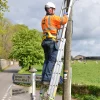Xwavia Deploys Superfast Wireless Broadband to Conwy in Wales UK
As promised Xwavia (formerly eXwavia), fresh from its somewhat controversial injection of new investment by the Welsh Government (here), has confirmed the deployment of its 10-100Mbps capable wireless broadband network into the market town of Conwy on the north coast of Wales.
The ISP claims that Conwy has some of the slowest internet connections in the United Kingdom, with services at Erw Fawr in Henryd crawling along with average download speeds of around 0.6Mbps (Megabits per second). By contrast local homes and businesses should now be able to receive between 10Mbps and up to 100Mbps.
Advertisement
As we’ve mentioned before, parts of Conwy are already expected to be covered by the state aid supported Superfast Cymru project with BT (here), although it will also be “one of the last areas in Wales” scheduled to receive superfast broadband under that project.
The ISPs effort intends to make use of the Welsh Government‘s revised Access Broadband Cymru (ABC) scheme, which provides grants worth up to £1,000 per premise in areas which have “slow broadband connections” (i.e. sub-2Mbps). It’s worth pointing out that ABC and the Superfast Cymru project are not supposed to conflict (i.e. to avoid duplication of the public investment).
Xwavias Statement:
“We are thrilled to announce that superfast broadband will be now be available to residents and businesses in Conwy for the first time, as of this month.
Currently, many residents and business-owners in Conwy do not have access high speed broadband and this is negatively effecting the local economy. We are therefore extending our service to ensure that individuals and businesses are given access to the broadband services they need and deserved.”
The plan to deploy into Conwy was first revealed last month, although it’s not currently known where Xwavia intends to go next. Unfortunately the ISP has also stopped mentioning their full package details and prices, although it is known that their entry-level 5Mbps option on an 18 month contract costs from £16.99 per month. Meanwhile the setup cost is likely to be positioned to take full advantage of the ABC scheme.
Mark is a professional technology writer, IT consultant and computer engineer from Dorset (England), he also founded ISPreview in 1999 and enjoys analysing the latest telecoms and broadband developments. Find me on X (Twitter), Mastodon, Facebook, BlueSky, Threads.net and Linkedin.
« All New Berkeley UK Homes to be Fibre Optic Broadband Compatible
Hybrid Broadcast Broadband Smart TV’s Face Hacker Threat »

















































Comments are closed